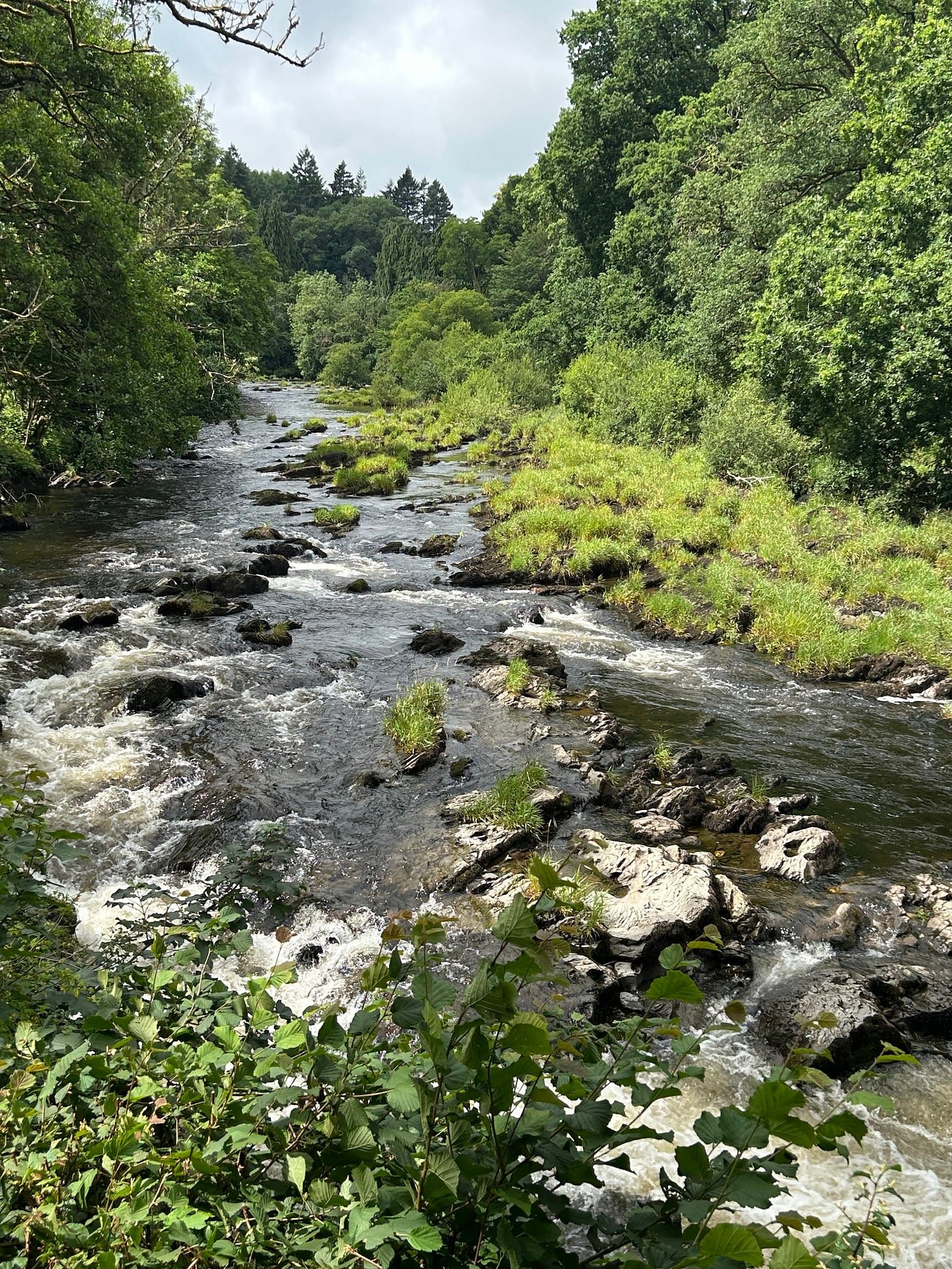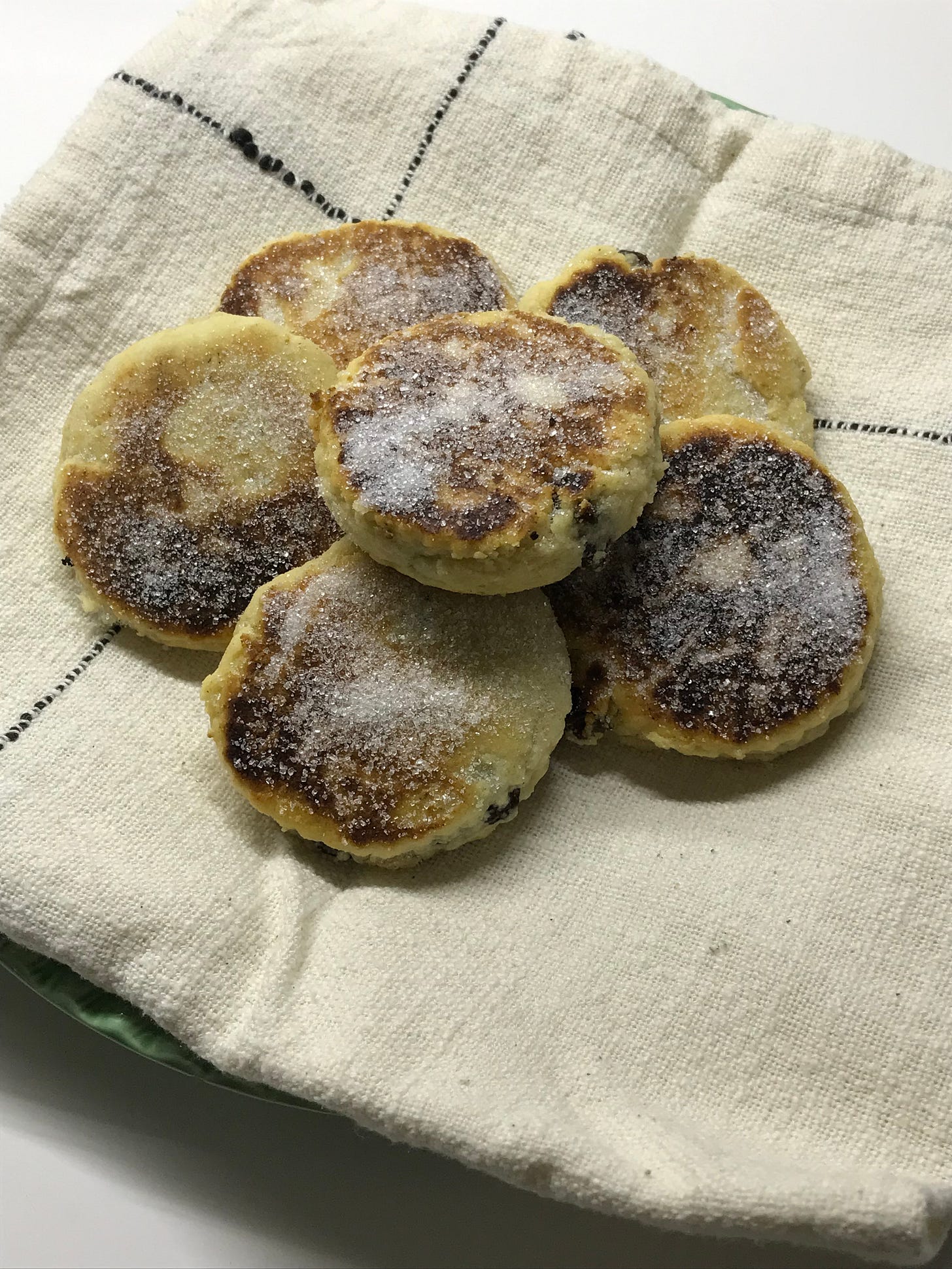Chalk drawing of Hilda Vaughan by Sam Morse Brown (1903-2001)
“A place is a story, and stories are geography, and empathy is first of all an act of imagination, a storyteller's art, and then a way of traveling from here to there.”
Rebecca Solnit ‘The Faraway Nearby’
When I was at Aberystwyth University, I had a boyfriend called Tim Richards whose father Tom Richards was a Welsh playwright and novelist. Tim’s mother was also Welsh but she hadn’t been brought up to speak the language, so when I knew him, Tim was unable to understand his father’s work.
There in one small example, we have an issue that still rumbles on in Welsh literary circles. Tom Richards wrote in his native tongue - his ‘thought language’ as he once put it. However, given that less than 25% of the current population of Wales actually think in Welsh, if someone from the other 75% writes in English, can what they create be regarded as Welsh literature?
The current ideology in Wales academic circles is to label Anglo Welsh literature as ‘post colonial’. I don’t deny at all the cultural imperialism of the English language over the Welsh, and thankfully much has been done to roll this back. However if you consider the work of writers from the Welsh Marches and the Welsh diaspora, you could make a strong case for it not being ‘post-colonial’ but rather being uniquely of itself.
Offa’s Dyke marks the traditional boundary between Wales and England but there is a strip some twenty miles wide inside Wales that is predominantly English speaking and has been for many centuries. Like many liminal places, the Welsh Marches are culturally ambivalent. Builth Wells, where I lived as a teenager, grew up around the site of a castle built in 1277 by King Edward I. In that same year the English King’s campaign to suppress the Welsh nation was helped by an army of nearly 10,000 Welshmen.
Meic Stephens says in the introduction to his ‘Book of Wales’ that Wales is a land of two languages and two literatures and it is the richer for it. The Welsh Marches have produced some interesting writers - and two of them were Vaughans.
Hilda Campbell Vaughan (1892-1985) was born in Builth Wells, the daughter of Henry Vaughan Vaughan who was a well to do solicitor. Henry wasn’t Welsh speaking and Hilda’s mother was Scottish. The extra Vaughan in Henry’s name is a nod to his ancestor, the 17th century Metaphysical poet Henry Vaughan (1621-1695) who also wrote in English.
In her later years Hilda wrote a couple of essays about her childhood. One of them is entitled ‘Far Away: Not Long Ago’. In it she describes how she was educated at home by a succession of Frauleins and Mademoiselles. What on earth would they have made of Builth in the early years of twentieth century? After the First World War, still unmarried at the age of twenty four, Hilda escaped her overbearing mother and like so many intelligent and intellectually curious women (George Eliot, Freya Stark) she saved her own life by enrolling at Bedford College in London.
Hilda Vaughan wrote twelve novels between 1925 and 1954 and she is one of the literary casualties of the twentieth century. Constrained by her linguistic inheritance she was too English for the Welsh literary scene, too provincial for the English literati, too well connected and too interested in the lives of quiet desperation led the country women of the harsh Welsh uplands. She also had the misfortune (if you look at it that way) to be married to a much more famous writer of the day - Charles Morgan.
In Glyn Jones's book ‘The Dragon Has Two Tongues’ - the seminal analysis of Welsh literature in English, Hilda Vaughan is summarily dismissed as one of the writers who "write about the squirearchy and its anglicised capers.” Ouch.
Glyn Jones had clearly never read anything by her. Vaughan’s novels are mostly about the farming families around Bannau Brycheiniog - the Brecon Beacons. Like her approximate contemporaries - Mary Webb, from the other side of the border in Shropshire and Winifred Holtby in Yorkshire, Hilda Vaughan can be considered a writer of place. Particularly places like the scene in the painting below which could easily be an illustration from one of her novels.
‘House on a Welsh Hillside’ Sir Cedric Morris (1889-1982)
I spent some time when I was in Wales last month trying to track Hilda down. When I lived in Builth as a teenager she was just a name, and to be honest I’d forgotten all about her until a chance encounter on Builth High Street. The rather dour Victorian house where she grew up is now the site of the police station. I remember the house well but it must have been demolished in the eighties. What I did find was her grave in Disserth churchyard. I literally had to uncover it but frustration was rewarded by getting inside of the stunning 13th century church. The grave inscription says “Hilda Vaughan Novelist / Wife of Charles Morgan Author” Hmm…
Disserth Church dedicated to St Cewydd.
I read Hilda’s novel ‘Iron and Gold’ this week. It was hard going at first. One of the things that she does is to try and reproduce the dialect speech of her characters in a way that now feels old fashioned and heavy handed. I had to work to get over it. It’s an interesting tale though - in part based on the folk story of the Lady of Llyn y Fan Fach - a Welsh version of the fairy Melusina or La Belle Dame Sans Merci.
Hilda and Charles Morgan were part of the literary scene of their day. Charles was the much lauded drama critic of ‘The Times’ and author of the best selling novel ‘The Fountain’. The couple were friends with Richard Hughes, Dylan Thomas and Augustus John. Valerie Fletcher, T.S. Eliot’s future wife was Morgan’s secretary and he introduced them to each other. Amazingly, last week when I mentioned this essay to my friend Wendy, she remembered a conversation from her long ago publishing days with Hilda and Charles’s children. They were very dismissive of their mother’s story telling whilst lauding their father’s ‘genius’.
When I was in Hay on the last day of my holiday, having given up hope of finding anything by Hilda in any bookshop, I found a critique of her husband’s work. It was £4 - because no one reads Charles Morgan any more do they? Inside the book was this compliment slip. Symbolic if you like of the work of a woman who has been overlooked - even by Virago and Persephone.
Reading Hilda Vaughan is like looking down the wrong end of a telescope. Her world feels very distant, but there are many things that have not changed. Hill farming is still harsh, the Welsh hills she describes are constant, and Hilda’s work is out there waiting to be rediscovered.
I’ll leave you with a photograph I took about half a mile from Hilda’s home, I’m sure it looks just as it did in her day. It’s my favourite kingfisher watching spot.
The River Irfon at Nant yr Arian, Builth Wells. June 2025.
I’ve made Welsh Cakes - how could I not? These are incredibly easy and also useful - keep a bag of the dough in the freezer or freeze some cooked (or uncooked) ones and give them a quick griddle to revive them. My friend Aldyth uses her great grandmother’s bake stone which has probably produced thousands of Welsh Cakes. I use my heavy Aga frying pan.
8oz SR Flour, 4 oz salted butter, 3oz sugar, a handful of sultanas and a large egg beaten. Extra sugar to sprinkle. Makes about 12 Welsh Cakes.
Rub the flour and butter together until it’s like breadcrumbs - or blitz in a food processor. Add the sugar and sultanas and bring the whole thing together with the egg. Roll out until about ¼” thick and cut out. Heat your griddle and wipe it over with a bit of oily kitchen paper. Cook about six cakes at a time, lowering the heat so that as well as being brown on the outside they have puffed up a bit and cooked in the centre. Sprinkle with more sugar whilst hot. These need eating freshly cooked but it's easy to refresh them.












Hilda Vaughan's novel, The Soldier and the Gentlewoman, is excellent. It's reprinted by Honno Press. I've been meaning to read more of her work, so thanks the reminder.
One of my A-level books was a play by Charles Morgan. I remember the line “Anyone for tennis?” as being in it, but that surely can’t be true. People did enter through the French windows, but that’s all I remember. Wikipedia is my friend, as ever, so I can tell you that it was “The Burning Glass”, and that it looks interesting—about scientific ethics. How strange that I recall nothing at all about it. But you’re right, no-one reads him now. However, you’ve made me want to read Hilda—and to visit that church!—not to mention make those cakes!!